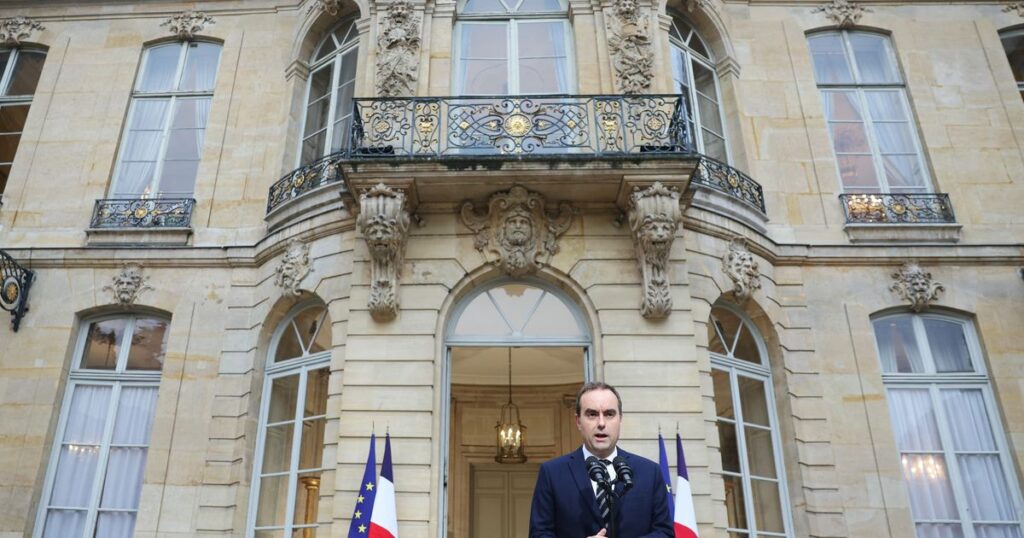PARIS — President Emmanuel Macron on Sunday appointed most of a new Cabinet that left many holdovers in key positions, a semblance of stability that will do little to dispel persistent doubts over the French government’s ability to survive long enough to pass a budget this year.
The appointments were made nearly a month after the previous government collapsed, leading Macron to pick a close ally, Sébastien Lecornu, as prime minister.
Two tough-talking politicians, Interior Minister Bruno Retailleau and Justice Minister Gérald Darmanin, will return from the last government.
But the appointment of Bruno Le Maire, the economy and finance minister between 2017 and 2024, as defense minister, came as a surprise. A veteran centrist politician, Le Maire was blamed by political opponents for France’s worsening economic situation after what critics said was an overly generous government spending policy during the coronavirus pandemic.
Roland Lescure, a former deputy industry minister, was appointed as the new finance and economy minister.
Eighteen ministers were appointed Sunday. A few more are expected to be appointed after a policy speech by the prime minister Tuesday afternoon, according to the French news media.
The Cabinet, composed of major centrist and conservative personalities, is largely similar to the two previous ones. Like Michel Barnier and François Bayrou, France’s last two prime minister, who managed to remain in office for less than a year, Lecornu will have to rely on a fragile alliance between centrist parties and the Republicans, France’s right-wing party, a constraint that guided the selection of the ministers.
Lecornu said Sunday that the new Cabinet reflected that political coalition, writing on social media that there was “no surprise” in his government’s commitments or appointments.
For other political leaders, that was part of the problem. Marine Le Pen, the French far-right leader, criticized the new Cabinet on Sunday, and Le Maire’s appointment in particular. “The choice of this identical government, flavored with the man who bankrupted France, is pathetic,” she said in a post on the social platform X.
Even Retailleau, the reappointed interior minister, expressed dissatisfaction over the Cabinet’s composition mere hours after joining it — underscoring how brittle Lecornu’s governing coalition is.
The bitter divisions among France’s political parties have complicated Lecornu’s most urgent task: passing a budget that is badly needed to reduce the country’s ballooning debt and deficit.
The presidency is, in many ways, France’s most powerful political office. But prime ministers and their Cabinets, who answer to the lower house of parliament, are formally in charge of domestic policy, including the budget, and they run the country on a day-to-day basis. Under the French Constitution, the president chooses the prime minister and appoints Cabinet members on the prime minister’s recommendation.
Lecornu is expected to lay out his budget plans in his speech Tuesday. He has already vowed that he will let parliament have the final word, promising not to use a constitutional tool — often used by minority governments like his — to push the budget bill through without a full vote.
That gamble was intended to preempt a no-confidence vote against Lecornu and to put the onus on lawmakers to strike a budget deal. But it is unclear whether France’s political parties, which do not have a culture of compromise, will play along.
The lower house of parliament is deadlocked by a collection of left-wing parties, a tenuous center-right coalition and a nationalist, anti-immigrant far-right contingent led by the National Rally party.
The National Rally’s appetite for compromise has diminished as it calls for new parliamentary elections. That has pushed Lecornu to turn to the Socialists, the more moderate party on the left, even though their demands run counter to the pro-business agenda that Macron wants to preserve.
Lecornu’s office has floated several measures over the past few days to placate the Socialists and the labor unions, including income-tax breaks for couples with low salaries, improved pensions for retired women and a tax on wealth held in certain financial holdings.
But he has flatly ruled out the Socialists’ main demands — like a 2% tax on wealth above 100 million euros (about $117 million), or a suspension of the newly raised legal retirement age. That has soured the Socialists on collaborating with Lecornu and frustrated labor unions, which have organized protests and strikes over the past few weeks against what they fear will be an austerity budget.
“Merely sprinkling a series of measures isn’t enough proof that he believes there is a need for a real change,” Marylise Léon, leader of the country’s largest union, the French Democratic Confederation of Labor, told reporters last week.
Olivier Faure, the leader of the Socialist Party, said Saturday that so far, the prime minister’s measures have amounted to “symbols with no real effect.”
“Let me say that enough is enough, and if things don’t change, we’re heading straight for no-confidence,” he told a newspaper, Le Parisien. He said that Lecornu had until Tuesday to make satisfactory proposals.

